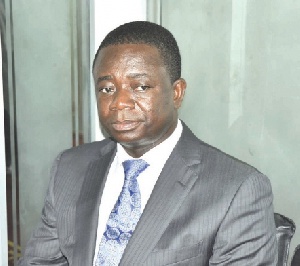 Stephen Opuni - Ghana Cocoa Board
Stephen Opuni - Ghana Cocoa Board
Bad management, corruption and politicisation of the supply of inputs to cocoa farmers has led to Ghana producing some 200,000 tonnes less than the cocoa it has already sold from an anticipated 900,000 tonnes, for which Ghana Cocoa Board last September borrowed a syndicated loan of US1.7 billion for the 2014/2015 season, says a public policy think tank.
According to Nana Attobrah Quaicoe, head of research for the Danquah Institute, "the cost to Ghana may be over $600 million in lost revenue and a more enduring loss of a century-old global reputation of Ghana as a dependable supplier of premium cocoa."
He does not, therefore, understand why "the President continues to tolerate the incompetence and corruption that is killing the cocoa industry under Dr Opuni."
Ghana supplied 920,000 tonnes in the previous season, for which it borrowed $1.5bn. The huge deficit this season which is between 150,000-200,000 tonnes, has caused grave concern in the international cocoa market, as Ghana ended up both over borrowing and overselling and not able to meet buyers' orders.
A Reuters report Wednesday was very critical of the management of the cocoa sector under Stephen Opuni. It said Ghana's long-standing reputation as a reliable supplier is "no longer" the case, according to traders.
Reuters went further to narrow it all down to the CEO. "One senior government official, who asked not to be named, said Cocobod's relationship with the industry had deteriorated since the appointment of Stephen Opuni as the regulator's CEO in late 2013."
Nana Attobrah of DI agrees. "It is more than obvious to all industry observers that Dr Opuni is at Cocobod for political reason and not for his competence. He is not for the farmer and he is not for the economy. We have been amazed at the lack of integrity in the procurement processes at Cocobod and even in the award of contracts for cocoa roads," he charged.
Yet, when President John Mahama showed his decisiveness this week to sack or reassign various chief executive officers of key state-owned organisation, Stephen Opuni was remarkably spared.
"Obviously, Dr Opuni must be doing something worthwhile in the eyes of the President," remarked a perplexed Nana Attobrah, adding, "But, whatever it is that he is doing, it certainly cannot be in the interest of the cocoa industry. It is tempting, therefore, to conclude that the huge sums of monies being generated through the sector is being exploited for some other purposes we are yet to ascertain and for that the President is well pleased in the CEO. I am sorry if I sound cynical, but can I be blamed?"
The loss in revenue for Ghana due to the unexpected low cocoa production, translates into some 2% of GDP.
Analysts blame the current weakening of the Cedi, which has suffered a record fall over the last week, trading at GHS4.45 to the dollar, on the cocoa problem. In all the Cedi has lost more than 80% of its value to the greenback since 2014, far in excess of the rate of depreciation in the entire 8 years of President J A Kufuor.
Daily ICCO price per a tonne of cocoa by close of last Wednesday was US$3,257.50. This means that Ghana stands to lose between $580 million and $750 million in expected revenue from the current cocoa season, said the DI analyst. "This is bound to affect our balance of trade and, invariably, weaken the Cedi against major currencies. We are also worried about the confidence of traders in next year's production," Nana Attobrah said.
Meanwhile, next door, the world's top cocoa producer is being asked to rather avoid over-production to keep cocoa prices high.
The International Cocoa Organization's Executive Director, Jean Marc Anga, has said the ICCO was forecasting production in Côte d'Ivoire to be the second largest harvest on record this season with a crop of 1.72 million tonnes.
Over-production risks causing a drop in world prices after its output hit a record 1.74 million tonnes last season.
In the decade before the 2013/14 season, Ghana's neighbour recorded average annual production of around 1.4 million tonnes.
"It is not out of the question that this production could reach up to 2 million tonnes," he told journalists in Abidjan, referring to future harvests.